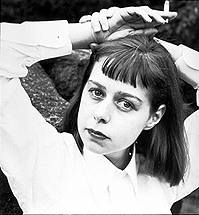Less than 10 miles from where I sit typing this still-dark morning, El Cerrito slumbers under a stringy web of Chinese elms and sagging power lines. Early, early in those lost mornings, lying in bed, letting the last of the summer breezes swell at the window, I would hear morning rise before its beams gave a pale glow to the luffing curtains. The sewing machine sound of the commuter train; the sticky suck of tires on asphalt; the slap and sigh of newspapers hitting driveways.
.
Before Aurora could reveal among the shadows that spun as headlights swept the walls and ceiling, the stand by my wide bed, the book that sat there, that it was a red book, that it was Proust, I would hear the far off cries of trains pulling through the Port of Oakland and wonder where they had been, where they would go. "Hop on," whispered the memory of a lover whose wanderlust led her to do exactly that, now so many years past. "Hop on," called the ghost of Kerouac and the legions of unknown and unknowable rail riders who could not function in the thin oxygen of normal. But their calls would fade and I would sink again into sleep until dawn when the birds sang me back from the deep interior to begin again, to try again to carve out a place in the stultifying atmosphere of the regular, white, christian world.
.
I did not hop on although I am near enough now that I could. The trains serving the port thunder past my bedroom not more than 100 yards from where I lay my head. Their whistles, once the far off cries of loons on the opposite side of the lake, now demand that I yield my consciousness entirely to them as they shake the ground, heavy wheels scrape the rails, grinding metal against metal, and monstrous whistles breathe out their warnings like whale songs reverberating through a pod of Leviathans but unmitigated by the dampening ocean.
.
Many here find the train noise a nuisance, but it awakens in me the romance of fleeing; the thrill of being gone, gone, gone—the promise that sustained me through the wasteland of childhood. Proust excelled at ecphrasis, making me shy about attempting to describe the voice of these trains as they whine, moan, shout, or blast through my subconscious. It is a music for which one cannot acquire a taste but only recognize a sympathique of heart. Contrary to every other literary tradition, the iconic American character is a loner, usually on the lam often as the result of a wrong choice made at a critical moment. We are not a band of merry men living outside the law in a shady forest, nor are we a brigade of pirates on the surging main, a fraternity of musketeers bound by the shared blood of a cut in, nor a crusade, nor any of many legends of round tables or castles in Spain.
.
The American hero is a black silhouette against the setting sun, walking/riding/driving into the eternal west, casting a long shadow back to the lesser beings left behind. I am about as west as I can get and still I want to run.
.
My incessant need to escape makes the port an almost ideal residence. I am reminded constantly, by the screaming military jets that roar into low airspace, the boats that slide out of the harbor, the buses, the trains, the freeway snarl of the Oakland maze, the BART line just outside my window, that I can go and while these comfort me, my first choice will always be words. Nothing can carry me as far, as swiftly, or with as much delight. As for the others, it’s good to know they are waiting.
Subscribe to:
Post Comments (Atom)


No comments:
Post a Comment